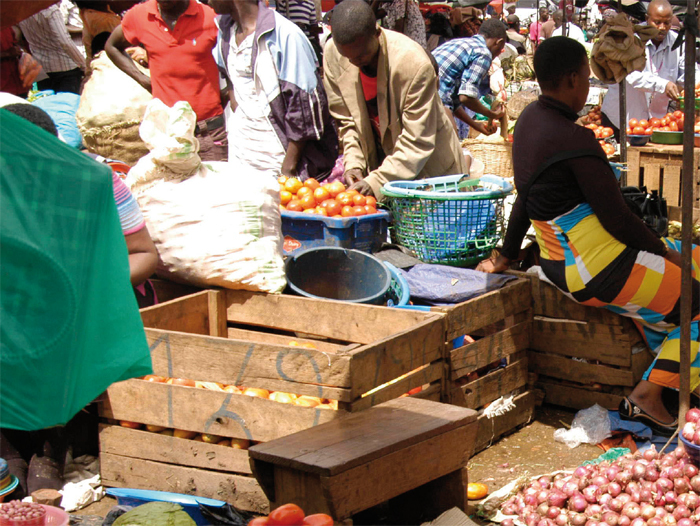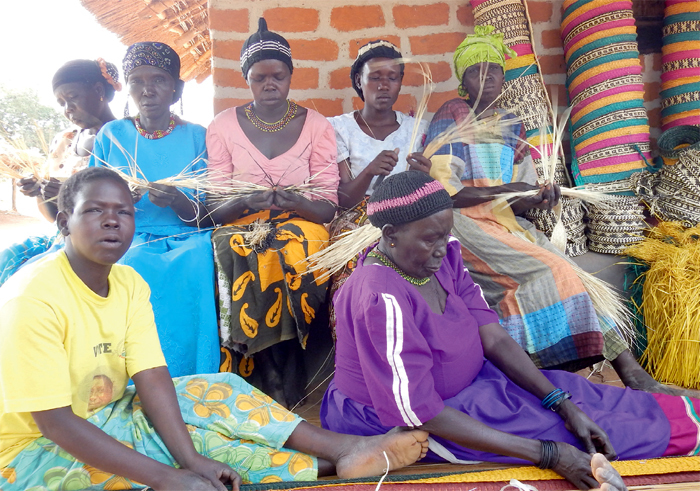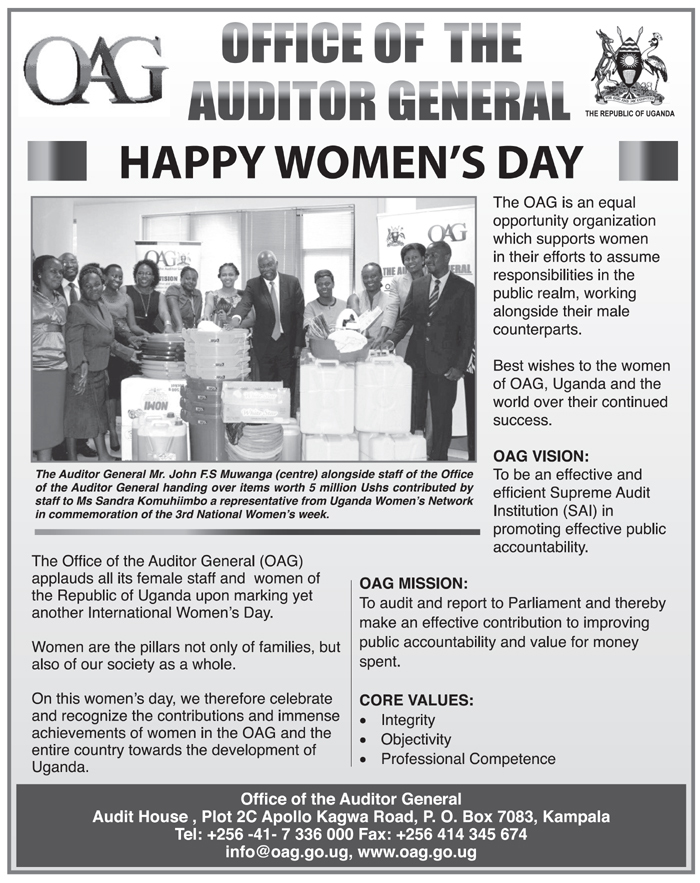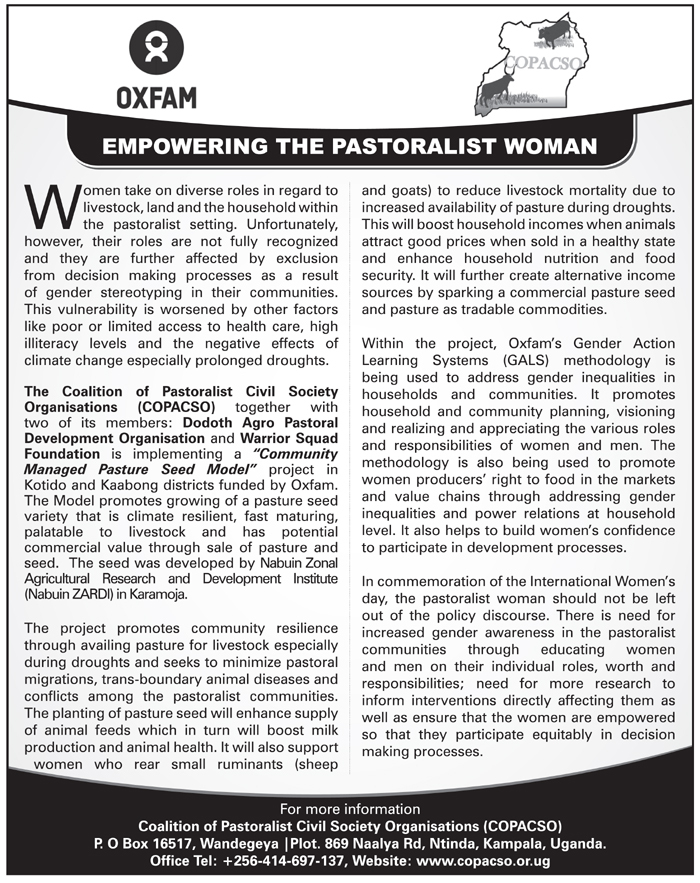Supplement: Empowering women for work
The changing world of work presents opportunities for which women need to be empowered to take advantage of. But work is not necessarily empowering, if the jobs are poor quality, low paid and dangerous
Why the market woman remains a hero in Africa
By Jacquiline Emodek
Today, Khadija Babirye Kizito is the programme manager of Pearl Development Initiative, thanks to the efforts of her mother, who was a food vendor in a market.
As a pupil at Nakivubo Blue Primary School, Babirye recalls how she used to help her mother carry cassava, beans and a charcoal stove to the market.
At the market, Babirye's mother cooked katogo (mixture of beans and cassava) which she would sell to supplement her husband's income. "I am the last born in a family of 10 children. My father used to work for the Uganda Railways Corporation in Kenya before he was transferred to Uganda.
When he was transferred here, my mother started working in a market near the present-day Usafi Market in Kampala," she says. Her story is the tip of the iceberg of many other stories of mothers earning a living in the markets.
From the rural to the urban centres, the market woman stands out. In small, but significant ways, they impact almost every home. "Every weekend, I go to the market to buy foodstuffs and encounter the market woman," Lynette Mugisa, an accountant, says.
"The market woman is a provider and a client. Besides selling produce, she is also knowledgeable," Mercy Munduru, a lawyer at FIDA, says. Munduru, who also practices farming, says she often gets practical lessons on what to plant during her encounters with the market women.
 Women make up the biggest percentage of market vendors in Uganda but the leadership positions are held by men
Women make up the biggest percentage of market vendors in Uganda but the leadership positions are held by men
For Rita Atukwasa, the executive director of the Institute for Social Transformation, the market woman contributes immensely to the country's Gross Domestic Product. "They have purchasing power and they pay taxes," she says.
Big markets
Charles Okuni, the chairperson of Nakawa market vendors, says of the 112,672 vendors in the market, the majority are women. They sell anything ranging from foodstuffs to vegetables, clothes, shoes and beddings.
According to Atukwase, women are synonymous with the market because it economically empowers them to look after themselves. "In the past, you did not require a lot of capital to acquire a stall in the market until a few years ago.
With about sh20,000, one could start off by selling tomatoes and earn an income," she says. Daisy Nakato, who sells garlic, tomatoes, green pepper and silver fish (mukene) in Kalerwe, Kampala, says she started off with capital of sh250,000 which her husband gave her.
"He wanted me to be selfreliant and I did not hesitate," she says. Nakato acquired her stall at sh120,000. Her main challenge is lack of facilities to preserve perishables like tomatoes.
She says she makes a huge loss when they rot yet they are bought at a high price and sometimes on credit. Atukwase says the market brings together women from all walks of life, including university graduates — they are all united for the purpose of earning a living.
Despite women making up a big percentage of vendors in Uganda's markets, Atukwase says they play a minimal role in the governance of the market. "This is because few of the women see themselves as leaders; so most of them settle for the position of a deputy or mobilisers,while the top positions are taken up by influential men that do not even own stalls in the markets," she says.
Okuni, however, says Nakawa Market is unique in that women are equally involved in running its affairs. He says positions like chairperson, treasurer and secretary general are not restricted to men.
Research
According to a study titled Research on market access and gender-based violence experienced by market women, there is male dominance in markets. Family obligations and male dominance account for 13% of the challenges faced by the market woman. CLICK HERE FOR MORE
ADVERTISER
- PRIDE MICROFINANCE LIMITED
- MINISTRY OF GENDER, LABOUR AND SOCIAL DEVELOPMENT
- UN WOMEN
- THE AIDS SUPPORT ORGANISATION
Why female representation in politics is not increasing
By Umaru Kashaka
Statistics since 1986 when the National Resistance Movement (NRM) government came to power indicate a steady rise in female political participation in elective offi ces.
The provision of a woman MP for each district and for 30% women's representation in Local Councils (LCs) has brought many women into positions of leadership.
"The hitherto invisible have become very visible and as a result, society is gradually accepting the inevitable; that women make as good leaders as men," says the Speaker of Parliament, Rebecca Kadaga. She says this in her paper she presented at the 10th Commonwealth Women's Affairs Ministers Meeting in Bangladesh in June 2013.
The paper is entitled ‘Women's political leadership in East Africa with specific reference to Uganda'. Kadaga, who has been the Kamuli Woman MP since 1996, says while affirmative action both at the level of Parliament and local government has increased numbers to a critical mass of women, the expected social transformation has remained slow.
"In a number of cases, appointment of women to leadership positions is perceived as doing them a favour for which they should be grateful. On the other hand, women's activism for ‘political space' has been more reactive than proactive," she says.
She adds that there is more emphasis on capacity development to get more women for empowerment to participate rather than supporting them to be more assertive and to reclaim what belongs to them by right. CLICK HERE FOR MORE
ADVERTISER
- REPRODUCTIVE HEALTH UGANDA
- UGANDA INDUSTRIAL RESEARCH INSTITUTE
- MINISTRY OF LANDS, HOUSING AND URBAN DEVELOPMENT
- EQUAL OPPORTUNITIES COMMISSION
Women fund boosts Koboko crafts
By Frank Mugabi
At the verandah of a grassthatched house in Raki village, Nyoriceku parish in Abuku sub-county, Koboko district, a group of 15 women assemble. Their work is to weave multicoloured household artefacts that are mostly associated with the Nubian cultural heritage.
Under their group name Alio Atizu, a Lugbara phrase that literally translates as "curing poverty," the women use pointed knives and needles to neatly weave beautifully coloured mats known by the Nubian name Birisi.
They are made of dry palm leaves and fibre from a riverine plant they say grows in swamps in the eastern Democratic Republic of Congo, but are sold in Koboko town and other emerging trading centres in the district.
 Members of Alio Atizu Women Group in Koboko district weaving mats. Photo by Frank Mugabi
Members of Alio Atizu Women Group in Koboko district weaving mats. Photo by Frank Mugabi
Special skill
This particular mat weaving technic has been passed on for generations with the skill usually passed on from mothers to daughters as part of home education.
In the northwestern district of Koboko, the craft is making added commercial importance with the implementation of the Uganda Women Entrepreneurship Programme (UWEP) commonly known as the Women Fund.
UWEP was one of the key campaign promises of President Yoweri Museveni during the February 2016 reelection bid. The money is given to women groups free of interest charges in order to provide the much needed capital to start up or boost women-owned micro, small and medium-sized businesses. CLICK HERE FOR MORE
ADVERTISER

Celebrating women's achievements
The month of March is set aside globally to celebrate women. In Uganda some women have been recognised for their achievements in the different spheres of life. However, despite their achievements, many more remain in the background. Jacky Achan identified and spoke to six of such women. CLICK HERE FOR MORE
ADVERTISER
